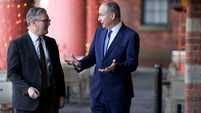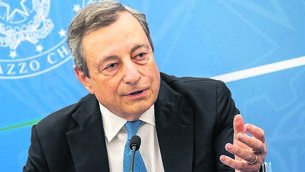When vital treatment is not medical tourism
Although I contracted prostate cancer at the medically young age of 50, I was lucky. Prostate cancer affects mainly old men; it is said that every man who lives into his eighties will die with prostate cancer but not necessarily of it. It’s a sneaky cancer — by the time any symptoms appear, it’s probably far advanced. I was lucky because I got diagnosed in time and because of my choice of urologist.
A good friend discovered he had prostate cancer when undergoing a standard insurance medical for a holiday home he was buying. He was in his early fifties and his treatment was invasive: While it cured the cancer, it left him with some permanent side-effects.
I started getting a medical check-up every year after that, including a PSA test — a blood test which checks for the presence of cancer. In May 2011, mine showed a high reading. I got an appointment with David Mulvin, a urologist in St Vincent’s Private Hospital. He sent me for a biopsy which involves sending a probe where the sun don’t shine to take 12 tissue samples from the prostate gland. One of my 12 was cancerous.
Mulvin explained the options: Brachytherapy, where radiotherapy pellets are inserted in the gland; surgery, where the gland is removed; and active surveillance, where the progress of the disease is monitored. Brachytherapy is less invasive than surgery but not as thorough and if the cancer returns after brachytherapy, surgery is no longer an option. His advice for me was active surveillance.
I felt strangely detached as I processed the news — it was like I was observing myself. I phoned the Irish Cancer Society to get its booklet on prostate cancer having been warned off going on the internet to research it. Then I promptly went on the internet to research it.
Six months later, a second biopsy showed two of the 12 samples were cancerous. Now we had a dilemma: Was the cancer on the move or had the biopsy just targeted better this time? Given my friend’s experience, I was reluctant to consider surgery but Mulvin recommended I get the operation done by Professor Doctor Jens-Uwe Stolzenburg at the University of Leipzig Hospital. Stolzenburg has done over 4,000 robotic, nerve sparing ‘radical prostatectomies’ in his career. It’s a much less invasive surgery in one of the most neurovascular rich areas of the body (only the brain is more so, which proves that, contrary to what some women claim, men’s brains and groins are separate entities).
This means that there is less likelihood of permanent damage to urinary and erectile functions. While the procedure is now available in Ireland, nobody has anything like Stolzenburg’s level of experience.
My health insurance company was as unhelpful as it could be. It decided that my procedure was ‘medical tourism’ so wasn’t covered. I argued that this was not an elective procedure and I was doing this on the advice of medical experts. Eventually and reluctantly, the company agreed.
I decided to travel to Leipzig on my own. My wife wanted to come with me, as did a couple of my brothers but I persuaded them that the last thing I wanted was to be worrying about how they were putting in their days in Leipzig: I just wanted to concentrate on myself.
The day before the operation was probably worse than anything that came after. I was admitted to the hospital in the morning and underwent a battery of tests for the afternoon. The tests were fine — but the constant explanations of all the possible risks freaked me out. The day did have its lighter moments: In the evening a strapping nurse marched into my room and announced, ‘I would like to shave you now’. I started to laugh and said, ‘Could we not just have a coffee or go to the cinema instead?’ After several minutes and my belly still sporting plenty of hair, her shaver ran out of battery and she exclaimed ‘Mein Gott, you are like a bear!’
Another Irish guy in the ward had the operation the day before I did. With extraordinary thoughtfulness, Donal said I could visit him, mere hours after his operation. That was very emotional. His wife also took me under her wing and kept asking if there was anything I needed. We’ve stayed in touch and it was great to compare notes on progress.
They came for me at 6.30am the following day. Surprising myself, I’d had a good night’s sleep. I showered, got smocked up, and was taken to theatre. Next thing I remember it was two in the afternoon and the Professor was telling me everything went very well.
The prostate is about the size of a walnut but is enlarged to full screen on the professor’s monitor. They make five incisions on the waistline and triangulate to excise the gland, put it into a little bag, enlarge one of the incisions and remove it, sending it to the lab for pathology analysis.
The pain was negligible. I was given painkillers to take for a week but stopped after two days because I didn’t need them. I had a catheter for a week which I hated but then told myself to wise up; my friend had his for six months.
The day before my surgery, the Professor explained the priorities in order of importance and chronology: Get rid of the cancer, restore urinary control, and regain erectile function. When the pathology report came back, the professor confirmed that the gland was 20% cancerous, as the biopsy had suggested, but that the surrounding membrane was 50% ‘infiltrated but not penetrated’. The cancer was on the move and, if I’d left it a few months later, I’d be facing a much bigger problem.
Without getting too explicit, it is very important that men, in particular, discuss health matters more openly. I had erectile function immediately and urinary control within a few weeks. I still feel blessed by that — without taking for granted that I dodged a bullet with cancer, if I’d had to hang up the boots on the sex life, I would have been very depressed.
I met three Irish guys who were having the same procedure in Leipzig, all in their 40s or 50s. You could spot the Irish immediately — we were all 20 or 30 years younger than the other patients, mainly from Germany, Netherlands, and Scandinavia.
One of the consultants confirmed that the incidence of prostate cancer in younger men is significantly higher in Ireland than elsewhere.
A week after I got back from Leipzig, I got a call from a woman I barely knew. She’d emailed me and got my out of office message saying I would be out for the rest of the month. Most people would have left it at the email but it turned out that she’d had breast cancer in her early thirties. We ended up chatting for about 45 minutes and I found it very therapeutic. Since then, any time I hear that someone has an illness, I always ask what. What I learned from that phone call was the importance and the benefits of discussing these things openly.
I’ve also had quite a few phone conversations with recently diagnosed people who have been referred to me by David Mulvin’s amazing PA Niamh, and by friends and family. Whatever good it does them to hear a layperson’s viewpoint, particularly since mine was a positive experience, I get far more benefit from the chats than they do.
















